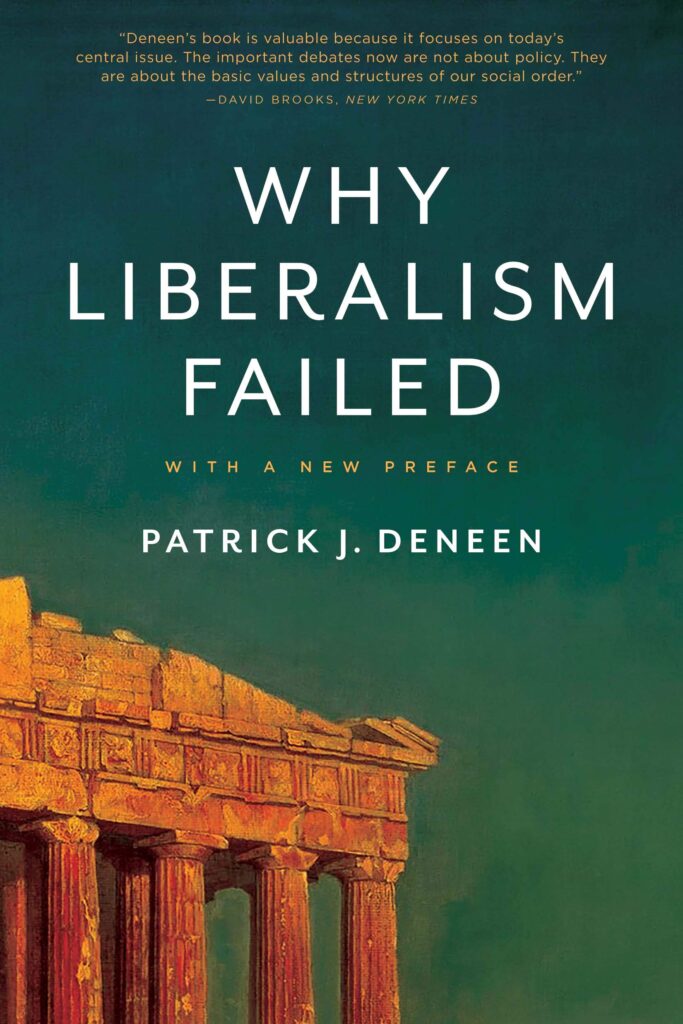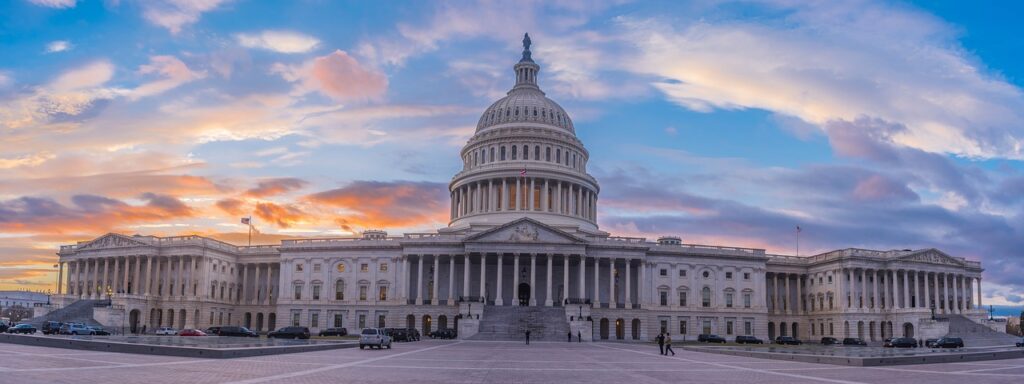
Before you start, please note that liberalism in this context is not “liberal vs. conservative.” It is not an attack on the “left” but rather a narrative on the system of liberalism that exists above and beyond right and left.
Most books I read make me feel good because they say things I already believe. Not because I’m that smart but because I, like all humans, bias toward materials that confirm my ideas. Once in a while, I get a book that does something different.
Such a book might counter my beliefs altogether, or it may offer a new perspective I hadn’t considered about one aspect of life or another.
However, there is another type of book out there that carries real magic. These books open me to a whole new view of a piece of the world. They make me conscious of some of the water I swim in every day but rarely notice.
Why Liberalism Failed is such a book.
At times, this book made me feel inadequate. I am not often engaged in political philosophy. Still, I relished the chance to consider current issues through a higher lens than left vs. right, covidiots vs. covidians, and the rhetoric of hate and division. The complexity of the ideas was overwhelming at points, but the read was well worth it.
My Takeaways and Thoughts Right Now
- Liberalism is a political ideology built to provide freedom but it has been tampered with. Liberalism is characerized by individuals who desire liberation to the greatest extent possible from any external constraints and limits. This kind of “freedom” sounds good on the surface, but we often neglect that liberalism was originally a means to promote self-governance and demphasize distant state governance. The goal then wasn’t personal freedom from everything as it has become so today. This shift in definition has created a state in which people claim to be powerless to overcome “oppressions” from anything that limits them – nature, biology, culture, norms, families, friends, responsibilities, accountability – and then rely on the state to remove those limits.The state readily complies, enlarges, and expands to “free” people, leading in turn to those same people experiencing more powerlessness. Liberalism does not give freedom, it takes it like a thief you threw a welcome party for before they stole your TV and left through the back door.
- The United States is not a democracy and it was never designed to be. We are taught early on about the democracy created by Washington, Jefferson, Hamilton, and their contemporaries. However, there was no intention from the founders to develop democracy. Publius – the collective pseudomonic author of the Federalist Papers – made clear in Federalist 10, that the views of the public are best passed through “the medium of a chosen body of citizens, whose wisdom may best discern the true interest of their country.” Remembering that democracy in which every person’s vote is needed and counts equally toward all decisions, was not the goal helps to enlighten a different conversation about governmental power in 2022 and how we got to a point of political elites who never leave office.
- In many ways, the two-party system is a distraction from the real issues of western cultures hating limits. In the past couple of years people have begun to identify as democrat or republican with more zeal than they do with religion, hometowns, or even family. The ideology war is intense and relativly meaningless. Both modern liberals and conservatives are operating to strengthen liberalism, just in different ways. The central stance of both parties is asking the government to provide and protect the greatest possible sphere of individual liberty. For the left, they focus on limits of sexuality, diversity, culture, and self-expression. The right hones in on limits of the economic market, property ownership, and extended libertarian interpretations of “don’t tread on me.” Both sides are vying for any limits on human desire to be destroyed and both give the state more power to do so. For example, the sexual revolution and the calls for government interaction has provided the state the power to define human sexuality and biology instead of God, communities, or even individuals doing so. On the other side, political conservatives have consistently supported state protection from infringements on the free market and for government salvation when it goes awry, such as in 2008 when the limits of borrowing against nothing came to bear. In the greatest nobel lie of liberalism, the government is ready to destroy limits to this new definition of freedom for the good of the people while doing so actually makes the people more powerless. The question we argue about is, “what freedoms are most important to human flourishing and how will the state create and protect them?” but the real question is, “what limits are necessary for human flourishing and how do we honor them?” Hint: the answer is not, “no limits at all.”
- The state in modern liberalism loves power and will do anything to keep it. Conspiracy theories about particular political elites and a deep state of global overlords are a dime a dozen. However, the truth might be much more straightforward than that. In the modern definition of liberalism, the state gets power as people shift identity away from families, communities, religions, and even genders and move toward political affiliations. The state is not designed to hand that power back. In a perfect example, Donald Trump ran for the presidency on the principle of smaller government and giving control back to the states and people. He failed to do so in part, because the system is much stronger than any individual and will not relent that power.
- Our biggest failure is the sum of our reliance added to our selfishness. We live in a world where both “reliant” and “selfish” synonmously describe us. In contrast, classic liberalism required self-governance. This meant that people and local communities had to do what we now rely on Washington D.C. to do including: define and enforce social contracts; help people in need; create jobs and a local economy; uphold moral standards; and sacrifice for the common good. People were required to be selfless and reliant only upon themselves and those in their social circle. In modern liberalism, people have shifted their reliance to the state. We offloaded the duties of self-governance to a distant land of policymakers and asked for the liberal state to treat us as children to be cared for instead of adults to be consulted and relied upon. We have also become selfish with the outright goal of “me over we,” celebrating anything to make life more comfortable and prosperous for the individual with essential disregard for the wellbeing of others. By adding selfishness and reliance together, we have created the system we love to hate.
- Our blindness to these issues is our fault. I believe more strongly everyday that many of the issues we see on the news are distractions from grander ones lurking through them all. Putting our face against the tree, we are blind to the forest surrounding it. Though when we become aware of our blindness, instead of thinking deeply and critically to examine complex systems and ideas, we scapegoat politicians. We are quick to blame someone or a political party for lying or keeping us in the dark. All the while, very few are willing to put in the effort to learn deep concepts on philosophy, governance, and sociology.
- The hope is in the future, if we can keep it. The future of liberalism is bleak. We all have been a bit too comfortable giving up our deeply held values in the name of freedom from limits. The reality of life is that there are limits. There are limits of nature, society, faith, personality, and biology. As a general rule, most of us personally limit ourselves far before the natural limits but on a governmental level, we want too badly to not be limited by the past or other people. The hope is in remembering the limits and even being thankful for them. Hope is in remembering that the family unit has a strength of limits and that a community or neighborhood carries unique and important features for us to thrive. It is getting back to our roots and knowing that to best contribute is not to influence the millions on TikTok but to go next door and offer help to your neighbor shoveling the driveway after a big storm. The hope is in our ability to recognize that personal freedom is best expressed within the limits of community, nature, and a God who knows better than we do.
My Questions
Of course, like any good book, I leave with as many questions as I do ideas. Here are a few I’m wrestling with:
- What can we not rely on community, family, and more local sources of governance to do? For example, could local communities in the 1950s South have led a movement to stop lynching? Maybe, but maybe not and I think we can all agree that lynching was not an acceptable practice for human flourishing in any way.
- How can a world obsessed with limitlessness come to accept limits in a healthy way?
- How can we delineate between limits of nature, God, and positive community and limits of greed, personal satisfaction, and power grabbing?
- Is it possible for a wise group of chosen citizens to not become agents of modern liberalism? How does that happen?
- Why was human nature essentially forgotten in the past 20 years of liberalism?
Should you read it?
Yes, if…you are ready to think deeply with a book, you are open to thinking beyond the left vs. right rhetoric, you care about the future of governance in the USA or other western cultures, or you are wondering about the massive division we face and how to start moving in a different direction.
No, if…you are in a season of life of needing to be working inward instead of outward (though this would be proof of the arguments in the book), you are set on your political framework and are not in the place for rethinking, your self-care is a priority over the political issues that have reigned anxiety on all of us, or you want to feel really smart (this book will break that).
Overall, I recommend Why Liberalism Failed. You will find appeal for both the left and right of modern politics but read beyond that. Use this book as a scalpel on the surgery to optimize your thinking about politics. See it as a chance to revisit ideas you long ago learned and haven’t reviewed for nuance since you were popping the collars of two different colored polos in 9th grade (or was that just me?).
Get the book here
Credit to the author Patrick J. Deneen and for the recommendation from the Bridgetown Church online bookstore

I loved your analysis on this man. It’s succinct, thoughtful and thought provoking. I appreciated the read.
Thanks, brother. I’m glad it was thought provoking for you as it was for me. Love when things get me thinking in deeper and better ways. Thanks for checking it out!